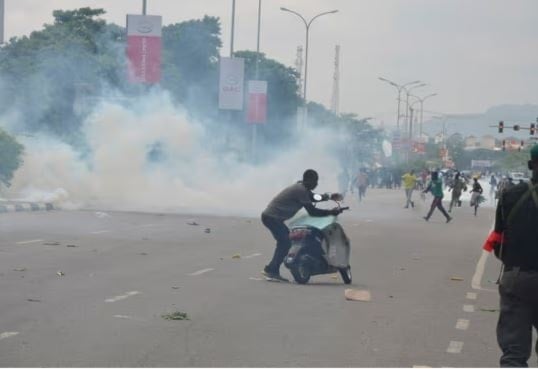Journalists under fire with bullets and teargas amid Nigeria protests
At least 50 journalists have been arrested in one day in Abuja, with nearly 700 protesters detained since the unrest started.
-

Police fire teargas during a protest in Abuja, Nigeria on August 3, 2024. (AP)
Nigerian security forces fired bullets and teargas at protesters and journalists during demonstrations on Saturday in Abuja, the capital city, amid the country’s economic crisis.
While it was not immediately clear whether the bullets fired at journalists were rubber or live rounds, the AP observed the aftermath, including bullet holes in a journalist's car and live bullets found at the protest site.
At least 50 journalists were arrested during Saturday's protests in Abuja, according to Amnesty International Nigeria. Nigerian police reported that nearly 700 protesters have been detained across the country, and nine officers have been injured during the protests, which have now entered their third day.
Protests against Economic crisis turn violent
At the Nigerian national stadium, where dozens of protesters had gathered, police officers were observed firing teargas to disperse the demonstrations just before hooded operatives, believed to be from the Nigerian secret service, arrived. This account comes from several protesters, journalists, and videos shared with the Associated Press.
According to six journalists who spoke on the record with AP, operatives from the Nigerian Department of State Service, typically hooded, quickly dispersed the protesters and then fired gunshots at the journalists who remained at the venue.
🇳🇬🇳🇬Police in Nigeria attack #EndBadGovernance protest in Kano. Demonstrators were gassed, beaten and shot. There are reports of deaths & serious injuries. Protests are demanding jobs, an end to hunger & poverty, and better results re: internal conflicts. pic.twitter.com/kLCSFSh7KS
— Eugene Puryear (@EugenePuryear) August 3, 2024
A video captured by one of the journalists showed armed operatives chasing people in front of the stadium. At least five of their vehicles were seen parked alongside those of the Nigerian police.
The journalists reported that they were standing well away from the protesters, wearing vests that clearly identified them as media, and were beside vehicles marked with media branding when they were fired upon.
According to the Centre for Journalism Innovation and Development’s (CJID) press attack tracker, there have been at least 31 recorded attacks on journalists since the cost-of-living protests began, including 11 arrests.
The Nigerian police reported that seven people died during the protests but claimed that none were killed by security forces. In contrast, Amnesty International stated that at least 13 protesters were killed by security forces.
The protests are reportedly driven by the worst cost-of-living crisis in a generation and allegations of mismanagement and corruption in Nigeria, Africa’s most populous country. Despite being one of the continent's leading oil producers and having some of the highest-paid public officials in Africa, Nigeria is home to some of the world's poorest people.

 3 Min Read
3 Min Read








